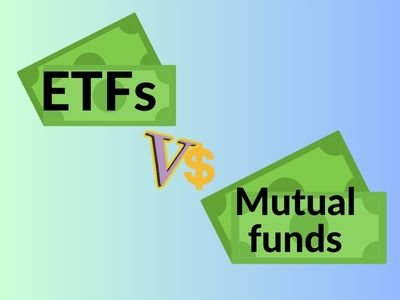Investing in the stock market has always been a popular way to grow one’s wealth. One of the most common ways to do this is through mutual funds and exchange-traded funds (ETFs).
Are you trying to decide between investing in ETFs vs. mutual funds? Both investment vehicles can offer a convenient way to diversify your portfolio and potentially grow your wealth over time, but each has its own unique characteristics.
While both are similar in that they pool together money from multiple investors to purchase stocks, bonds, and other assets, there are differences that may make one more suitable than the other for your investment needs. In this article, we’ll explore the differences between ETFs and mutual funds and help you decide which one may be the right choice for you.

ETFs vs. Mutual Funds
Before we dive into the pros and cons of each investment vehicle, let’s first define what they are.
Exchange-traded funds (ETFs) are investment funds that are traded on a stock exchange, much like individual stocks. They hold a basket of securities, such as stocks or bonds, and offer investors a low-cost way to diversify their portfolios. ETFs are bought and sold throughout the day, just like individual stocks, and their prices fluctuate based on supply and demand. Because of their structure, ETFs typically have lower expenses than mutual funds.
Mutual funds, on the other hand, are investment funds that are managed by professional fund managers who make investment decisions on behalf of the investors in the fund. They pool together money from multiple investors to purchase a diversified mix of stocks, bonds, and other assets. Unlike ETFs, mutual funds are priced only once per day, after the market closes. Mutual funds generally have higher expense ratios than ETFs due to the additional management fees and expenses.
Pros and Cons of ETFs
One of the biggest advantages of ETFs is their low cost. Because ETFs are passively managed and don’t require as much oversight as mutual funds, they typically have lower expense ratios. Additionally, because ETFs trade like stocks, investors can buy and sell them throughout the day at the market price. This can provide more flexibility and control over your investments.
Another advantage of ETFs is their tax efficiency. Because they are structured differently from mutual funds, ETFs can be more tax-efficient. ETFs are designed to minimize the number of taxable events that occur within the fund, which can help investors keep more of their returns.
However, there are some potential downsides to investing in ETFs. One is that ETFs can be more volatile than mutual funds, especially those that track a specific sector or niche market. Additionally, because ETFs trade throughout the day, investors may be tempted to make more frequent trades, which can increase the risk of making emotional investment decisions and incurring transaction costs.
Pros and Cons of Mutual Funds
One of the biggest advantages of mutual funds is the expertise of the professional fund managers who oversee the investments. These managers have the knowledge and experience to make informed investment decisions, which can potentially lead to higher returns for investors. Additionally, because mutual funds are priced only once per day, investors don’t have to worry about the price fluctuating throughout the day.
Another advantage of mutual funds is the ability to invest in a diversified portfolio with a relatively small investment. Many mutual funds have minimum investment requirements as low as $1,000, which can make them accessible to a wide range of investors.
However, one potential downside of mutual funds is their higher expenses. Because they are actively managed and require more oversight than ETFs, mutual funds typically have higher expense ratios. Additionally, mutual funds may be less tax-efficient than ETFs, which can lead to higher tax bills for investors.
Which Is Right for You?
Deciding between ETFs and mutual funds ultimately comes down to your investment goals, risk tolerance, and personal preferences. If you’re looking for a low-cost, tax-efficient investment vehicle and are comfortable with potentially higher volatility, ETFs may be the right choice for you.





Id like to thank you for the efforts you have put in penning this site. Im hoping to see the same high-grade blog posts by you in the future as well. In fact, your creative writing abilities has inspired me to get my own site now 😉